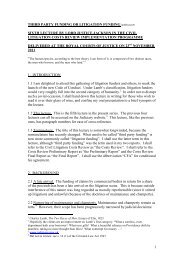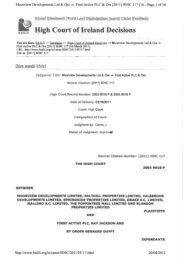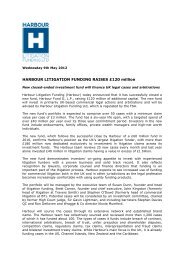Document 2 - Harbour Litigation Funding
Document 2 - Harbour Litigation Funding
Document 2 - Harbour Litigation Funding
Create successful ePaper yourself
Turn your PDF publications into a flip-book with our unique Google optimized e-Paper software.
the OFT being charged with fronting such claims as part of its consumer protection role, similar to the<br />
regimes in Denmark and Norway.<br />
Mr. Justice Barling cautioned against some other more specific aspects of the proposals including<br />
introducing a rebuttable presumption of loss in cartel cases and any relaxation of joint and several<br />
liability of cartel members. There was also discussion on the differing limitation periods for civil claims<br />
in Scotland compared to England and Wales.<br />
As regards interdict, Heriot Currie QC thought that the Commercial Court in Scotland has a fairly good<br />
track record in dealing with interim relief, citing the recent unreported Lothian Buses / Edinburgh<br />
Airport case, and that an alternative option to obtain interim relief from the CAT may not have a big<br />
impact.<br />
Graeme Young thought that it would be important for the CAT to be able to grant interim orders in<br />
Scotland. This might help give practitioners more confidence in bringing claims, knowing their case<br />
would be heard by a specialist judge. Beyond this he thought extending the jurisdiction of the CAT<br />
might not lead to many more standalone damages claims, but that the collective opt-out regime was<br />
likely to be much more attractive for the larger follow-on claims. To be effective though there also<br />
needed to be some established system for collective settlements, perhaps something similar to the<br />
Dutch model. This would be in the interests of both claimants and defendants. Graeme cautioned<br />
against a potential confusion of the public enforcement role of the OFT (and the future CMA) and any<br />
role it might be given to encourage or facilitate follow-on claims.<br />
The general sentiment of the panel was that whilst any reform that increases protection of consumers<br />
and SMEs, such reforms should not come at the expense of the already established mechanisms in<br />
place in Scotland. With the Scottish Government considering proposals on collective redress, these<br />
issues will dominate discussions for some time to come.<br />
Stephen O'Dowd and Dr. Till Schreiber gave us an overview of their organisations and their activities<br />
in respect of competition litigation. Stephen outlined the options for clients when considering funding<br />
litigation and the market and different models for litigation funding (which go much further than just<br />
funding competition litigation). <strong>Harbour</strong> is currently funding at least three competition claims, two<br />
follow-on and one abuse of dominance claim. <strong>Harbour</strong> does not take full control of the claim. It<br />
charges a % of proceeds, but subject to a floor equal to a multiple of the monies actually spent by<br />
<strong>Harbour</strong>. The client however pays nothing if the case is unsuccessful. Dr. Till Schreiber outlined the<br />
different model operated by CDC. CDC effectively buys up multiple from a number of victims of a<br />
cartel (SMEs but also large corporates) and bundles them together to pursue them in its own name.<br />
This type of 'book-building' provides interesting opportunities for external investors to fund claims that<br />
might otherwise have been individually too small to pursue.<br />
We then had time for some Q&A, with some interesting contributions from the floor, including some<br />
thoughts on the reasons for the relatively low number of private actions before the Scottish courts<br />
from Catriona Munro of Maclay, Murray & Spens, and some reactions from Lord Hodge, Principal<br />
Commercial Judge at the Court of Session, on the practicalities of dealing with and managing<br />
competition cases in the Scottish courts. The discussion then concluded with drinks at Dundas &<br />
Wilson's offices.<br />
The next SCLF event is on 'Competition Law and the Individual' on 21 November 2012.



![Neutral Citation Number: [2010] EWHC 941 (QB) - Harbour ...](https://img.yumpu.com/47188668/1/190x245/neutral-citation-number-2010-ewhc-941-qb-harbour-.jpg?quality=85)
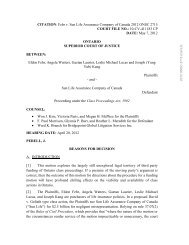
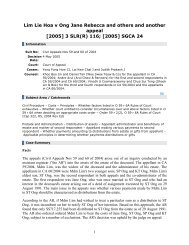
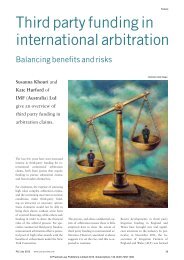
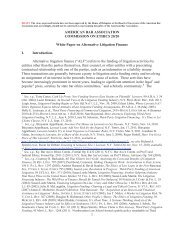

![Hall v Poolman [2009] - Harbour Litigation Funding](https://img.yumpu.com/37488843/1/190x245/hall-v-poolman-2009-harbour-litigation-funding.jpg?quality=85)


![[2013] SGHC 135 - Singapore Law Watch](https://img.yumpu.com/37488807/1/184x260/2013-sghc-135-singapore-law-watch.jpg?quality=85)
